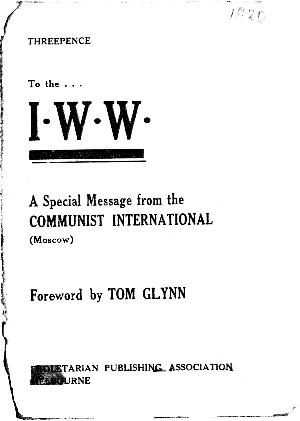Communist International
Lars Lih: Bolshevism and revolutionary social democracy

Lenin.
By Lars Lih
New voices and new views on revolutionary history

By John Riddell
May 28, 2012 -- Links International Journal of Socialist Renewal/johnriddell.wordpress.com -- Some familiar issues were addressed with originality and new vigour at the Historical Materialism conference in Toronto on May 11–13. Attendance at the three sessions on revolutionary history, organised by Abigail Bakan (Queen’s University), ranged between 30 and 75 of the 400 conference participants.
Given that eight of 11 presentations had a European focus, the discussions were opened fittingly by Montreal scholar Daria Dyakonova with a paper on a little-studied aspect of revolutionary history here in Canada: the birth of communism in Quebec.
The pioneers of this movement faced objective obstacles, including severe repression and formidable opposition by the Catholic Church. In addition, Dyakonova explained, “after Lenin and especially after 1929”, the Canadian Communist Party’s “policies were determined from Moscow”. The line dictated by the leadership of the Communist International (Comintern) was “often at odds with national or local needs”.
How revolutionaries of Lenin’s time resisted austerity

Towards the end of 1921, an attempt was made to shift the burden of debt to the working class through higher sales taxes. The German Communist Party opposed this, demanding instead an increase in the tax on wealth and the seizure of assets.
Introduction by John Riddell
April 26, 2012 -- Links International Journal of Socialist Renewal/johnriddell.wordpress.com -- Economic collapse drives workers into hunger and destitution. Foreign powers extort huge payments, forcing the national economy toward bankruptcy. The government forces workers to pay the costs of capitalist crisis.
This description of Greece in 2012 applies equally to Germany in 1921.
How should a workers’ party respond to such a breakdown? The proposals of the German Communist Party (KPD) included a simple approach to fiscal policy: tax those who own the country’s productive wealth.
The KPD was then a member of the Communist International, whose leadership included V.I. Lenin, Leon Trotsky and Gregory Zinoviev.
Un debate de actualidad: Gobierno de trabajadores y transición al socialismo
Por John Riddell
Decisión desconocida sobre gobiernos de los trabajadores

[In English at http://links.org.au/node/2451.]
Por John Riddell
Fecha de publicación: 01/02/12 -- America XXI -- La discusión en idioma inglés de la Internacional Comunista de 1922, sobre el llamado a crear gobiernos de los trabajadores, se ha basado en un anteproyecto que fue alterado de manera significativa antes de su aprobación. Aquí, tomado de la primera traducción al inglés, está el texto enmendado que el Congreso realmente adoptó.
El llamado a crear un gobierno de los trabajadores surgió a partir de las luchas de los trabajadores alemanes en 1920, como modo de plantear la necesidad de un poder de los trabajadores, en un contexto en el que no existían estructuras alternativas, como congresos revolucionarios o soviets.
Workers’ governments and socialist strategy — a discussion

"The FSLN government in Nicaragua immediately after the fall of the Somoza dictatorship may qualify as a workers' gove
A ‘workers’ government’ as a step toward socialism

Soviet poster dedicated to the fifth anniversary of the October Revolution and Fourth Congress of the Co
The Comintern in 1922: the periphery pushes back

Communist Party of Germany (KPD) member Paul Levi played a leading role in several debates.
By John Riddell
December 4, 2011 -- Links International Journal of Socialist Renewal, for more articles by John Riddell, go to http://johnriddell.wordpress.com -- Until recently, I shared a widely held opinion that the Bolshevik Party of Russia towered above other members of the early Communist International as a source of fruitful political initiatives. However, my work in preparing the English edition of the Comintern’s Fourth Congress, held at the end of 1922, led me to modify this view.(1) On a number of weighty strategic issues before the congress, front-line parties, especially the Communist Party of Germany (KPD), played a decisive role in revising executive committee proposals and shaping the Congress’s outcome.]
When I translated the first page of this congress, I was not far distant from the view of Tony Cliff, who, referring to the 1921–22 period, referred to the “extreme comparative backwardness of communist leaders outside Russia”. They had an “uncritical attitude towards the Russian party”, which stood as “a giant among dwarfs”, Cliff stated.(2)

